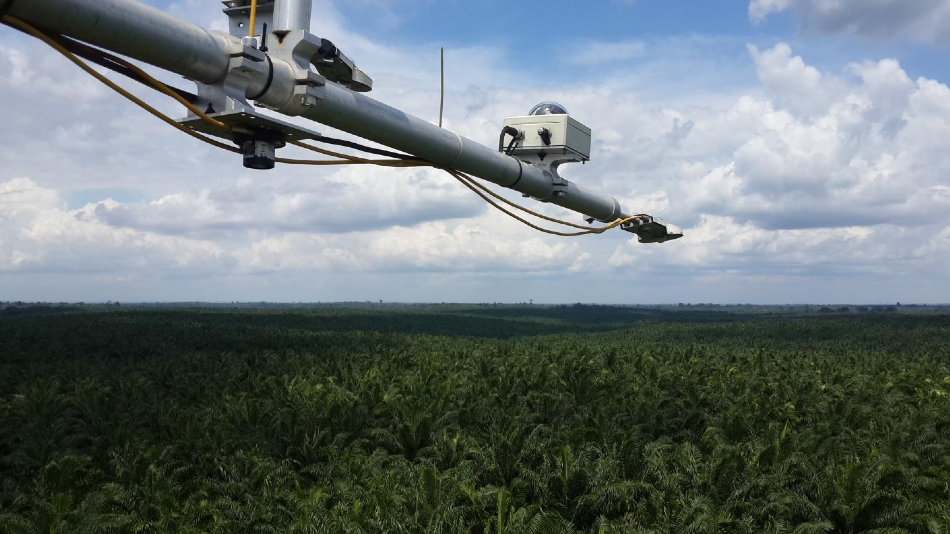Feb 28 2020
Despite the rising controversy over the sustainability of vegetable oil biofuels, these products are increasingly being utilized as a substitute for fossil fuels.
 Radiation sensors and view from flux tower over oil palm plantation in Jambi, Indonesia. Image Credit: Ana Meijide, University of Göttingen, 2015.
Radiation sensors and view from flux tower over oil palm plantation in Jambi, Indonesia. Image Credit: Ana Meijide, University of Göttingen, 2015.
In a recent study headed by the University of Gottingen, scientists analyzed the impact of palm-oil biodiesel on greenhouse gas emissions for the whole life cycle.
The scientists discovered that palm oil presents an even bigger problem when compared to the use of fossil fuels. For example, using palm oil from first-rotation plantations in which forests had been cleared to encourage the cultivation of palm trees actually resulted in increased greenhouse gas emissions.
But plantations established on degraded land have the potential for carbon savings. Additionally, greenhouse gas emissions could be decreased by introducing new varieties of oil palm with a greater yield or longer rotation cycles. The results of the study were published in the Nature Communications journal.
In the recent past, the use of vegetable oil-based biofuels has increased significantly because they are regarded as a “greener” alternative to fossil fuels. Even though the sustainability of vegetable oil-based biofuels is being questioned more and more, the demand for such fuels keeps growing. This trend has triggered a continuous expansion of the cultivation of oil palm across the tropical regions, particularly in Indonesia.
Greenhouse gas emissions are believed to be significant because they have extensive environmental impacts, like climate change. In this context, the European Union’s (EU) Renewable Energy Directive specifies minimum greenhouse gas emission saving requirements for biofuels—throughout their entire lifespan, palm-oil biodiesel has to exhibit a minimum of 60% savings on greenhouse gas emission as opposed to fossil fuel.
In this research, scientists from the German-Indonesian Collaborative Research Centre “Ecological and Socioeconomic Functions of Tropical Lowland Rainforest Transformation Systems (EFForTS)” investigated the entire lifespan of palm-oil biodiesel. They utilized field-based measurements of greenhouse gas fluxes during varying stages of the cultivation of oil palm in the Jambi province located in Indonesia.
Mature oil palms capture high rates of CO2, but there are serious consequences for the environment from clearing forest. In fact, carbon emissions caused by cutting down forest to plant oil palms are only partially offset by the future carbon capture.
Dr Ana Meijide, Study Lead Author, Agronomy Group, Department of Crop Sciences, University of Gottingen
The research revealed that palm-oil biodiesel obtained from the first-rotation cycle of palms generates 98% more emissions when compared to fossil fuels.
The negative impact of biodiesel on greenhouse gases is reduced when palm oil comes from second-generation oil palm plantations.
Alexander Knohl, Study Senior Author and Professor, Bioclimatology Group, University of Gottingen
Only palm-oil biodiesel obtained from the second-rotation cycle of plantations reaches the actual greenhouse gas emission savings stipulated by the EU directive.
On the basis of these results, the scientists tested other situations that can potentially result in more greenhouse gas savings when compared to present models.
Longer rotation cycles, such as extending the plantation cycle to 30 or even 40 years compared to the conventional 25 years, or earlier yielding varieties have a substantial positive effect on greenhouse gas emissions—both scenarios are doable and relatively easy to implement.
Dr Ana Meijide, Study Lead Author, Agronomy Group, Department of Crop Sciences, University of Gottingen
“This research highlights how important it is that farming practices and government policies prevent further losses of forest and promote longer rotation cycles,” concluded Meijide.